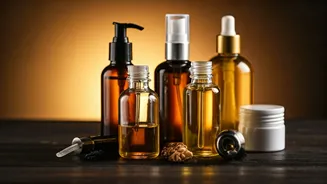Wrong Oil Choice
Selecting the right hair oil is vital for achieving the desired results and avoiding potential harm. One of the most common mistakes is using an oil that
doesn't match your hair type. For instance, individuals with fine hair should opt for lighter oils like argan or jojoba, which won't weigh down the strands. In contrast, those with thick, coarse hair may benefit from heavier oils such as coconut or olive oil, which can provide deep moisturization. Using the incorrect oil can lead to issues like greasy build-up, dryness, and even hair loss. Therefore, it's essential to understand your hair's needs before choosing an oil. Considering factors like porosity and the scalp's oil production level can help in making a well-informed decision.
Excessive Application
Applying too much oil can be detrimental to your hair's health and appearance. While oiling provides essential nourishment, overdoing it can result in a host of problems. Excess oil can clog hair follicles, leading to dandruff, scalp irritation, and even hindering hair growth. Furthermore, it creates a heavy, greasy look that's difficult to manage and wash out. A little oil goes a long way. Typically, a few drops or a tablespoon, depending on the length and thickness of the hair, are sufficient for effective conditioning. The ideal amount allows the oil to spread evenly without causing an excessively oily feel. It's advisable to start with a smaller quantity and add more if needed, ensuring you don't over saturate the hair.
Aggressive Massage
The way you massage oil into your scalp can impact its effectiveness and overall hair health. Massaging too aggressively can potentially damage the hair follicles and weaken the roots. A vigorous massage can also cause friction, leading to breakage and hair fall. The correct technique involves gentle, circular motions using your fingertips. This method stimulates blood circulation in the scalp, promoting hair growth and ensuring the oil penetrates effectively. The pressure should be light, avoiding any pulling or tugging. Taking your time with the massage, dedicating about five to ten minutes, can help you relax and thoroughly condition the scalp.
Overnight Stays
Leaving hair oil on overnight is a practice that can sometimes backfire. While some people believe prolonged oiling enhances benefits, it can actually lead to several issues. When oil remains on the scalp for an extended period, it attracts dirt and pollutants, causing build-up and potentially blocking hair follicles. This can result in scalp infections and dandruff. Also, the oil may make your pillowcase oily, promoting bacterial growth. For most hair types, leaving oil on for an hour or two is sufficient. If you choose to oil overnight, consider wrapping your hair with a towel or shower cap to protect your pillow and avoid excessive build-up. Always wash your hair thoroughly after oiling.
Ignoring Scalp Issues
Failing to address underlying scalp problems is a significant mistake. Often, hair oiling is seen as a universal solution, but it might not address specific scalp conditions. If you have dandruff, dryness, or other scalp issues, oiling alone might not be sufficient. In such cases, the oil might worsen the condition by creating build-up and exacerbating the problem. Consider using medicated shampoos or consulting a dermatologist to find solutions appropriate for your specific needs. Before oiling, it's crucial to identify any scalp issues and address them separately. Moreover, choosing oils specifically formulated to tackle those issues can improve the effectiveness of your hair care routine. Prioritize the overall health of your scalp to maximize the benefits of oiling.



















